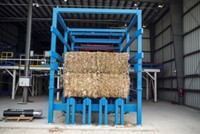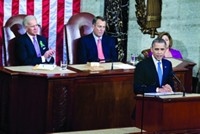Advertisement
Grab your lab coat. Let's get started
Welcome!
Welcome!
Create an account below to get 6 C&EN articles per month, receive newsletters and more - all free.
It seems this is your first time logging in online. Please enter the following information to continue.
As an ACS member you automatically get access to this site. All we need is few more details to create your reading experience.
Not you? Sign in with a different account.
Not you? Sign in with a different account.
ERROR 1
ERROR 1
ERROR 2
ERROR 2
ERROR 2
ERROR 2
ERROR 2
Password and Confirm password must match.
If you have an ACS member number, please enter it here so we can link this account to your membership. (optional)
ERROR 2
ACS values your privacy. By submitting your information, you are gaining access to C&EN and subscribing to our weekly newsletter. We use the information you provide to make your reading experience better, and we will never sell your data to third party members.
Environment
Bush Proposes 20% Cut In U.S. Gas Use
President wants more non-oil-based fuel, better vehicle efficiency
by Jeff Johnson
January 24, 2007
An ambitious boost for ethanol, a modest increase in vehicle efficiency, and a nod to the importance of technological solutions for climate change were among a small number of energy and science topics mentioned by President George W. Bush on Jan. 23 in his State of the Union address.
Unlike last year, there was no $50 billion American Competitiveness Initiative for basic science or new R&D tax credits and science education proposals. But like last year, the President continued to commit the nation to cutting oil imports (C&EN, Feb. 6, 2006, page 7).
His intention this time is to cut projected gasoline use by 20% by 2017. The plan would reduce U.S. gasoline consumption by 8.5 billion gal through better vehicle efficiency and cut another 35 billion gal of gas by substituting renewable or alternative fuels.
Bush's new alternative fuel target is nearly five times the government's current goal of producing 7.5 billion gal of renewable fuel by 2012. Nearly all of today's renewable fuel comes from corn-based ethanol, and the field is booming. Refiners expect to reach the 2012 target this year or next.
However, Bush's plan would eat up the nation's entire corn crop. Hence, the new goal will be a driver for cellulosic feedstocks—grasses, trees, corn stalks—as well as more energy crop acreage and more intense farming methods (C&EN, Dec. 4, 2006, page 57).
The Administration allows fuel options besides ethanol, but with the exception of biodiesel, none are produced today in sufficient quantities to influence the President's goal.
The Administration's vehicle efficiency goals are premised on a 4% annual efficiency increase beginning in 2010. Details are few, and Bush wants specifics to be left to the secretary of transportation. The Union of Concerned Scientists estimates Bush's proposal would raise average efficiency to 34 miles per gal from today's top rating of 27 mpg.
The day after Bush's address, the Administration issued an executive order requiring federal agencies to improve energy efficiency and cut annual energy use by 3% through 2015. And the President visited DuPont's biofuels experiment station in Wilmington, Del., where he toured the company's biobutanol and cellulosic research projects.





Join the conversation
Contact the reporter
Submit a Letter to the Editor for publication
Engage with us on Twitter